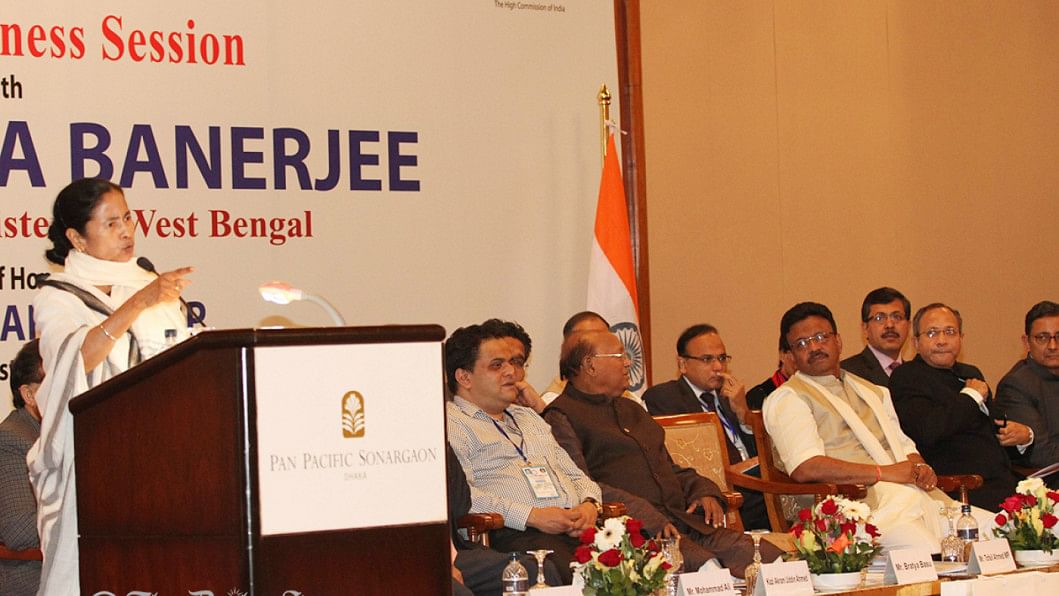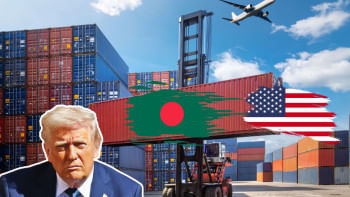Mamata for quick trade dispute settlements

Visiting West Bengal Chief Minister Mamata Banerjee today proposed to form a joint business council for quick solution of disputes in bilateral trade and investment.
The proposal comes at a time when the business community in Bangladesh points at tariff, non-tariff and para-tariff barriers as hurdles to increasing exports to India.
India had withdrawn all kinds of duties on the import of Bangladeshi products, except 25 alcoholic and drug items, in November 2012.
“Create a joint business council soon, so that we can solve the problems immediately. The council will identify the problems. If I face any problem, you will solve it, and if you face any problem, I will solve it immediately to increase bilateral trade,” said Mamata, addressing a meeting as the chief guest at Sonargaon Hotel in Dhaka.
India-Bangladesh Chamber of Commerce and Industry (IBCCI), Federation of Bangladesh Chambers of Commerce and Industry (FBCCI) and Indian Chamber of Commerce (ICC) organised the meeting with support from the Indian High Commission in Bangladesh.
“Let us work together. If you accept me as a sister, please forget the relationship of give and take. You (Bangladesh) have a lot of things to receive from me.”
She also proposed developing the Bangladeshi part of the Sundarbans to attract more tourists from all over the world.
On the two major disputes between the two countries – land boundary agreement and Teesta water sharing deal – she said the land boundary agreement is in its final stage, while the Teesta deal will also be solved in near future.
The Teesta deal with Bangladesh will take a little more time as both countries have to resolve some domestic issues before signing anything, she said. “But trust me, the Teesta deal will be signed.”
The chief minister also suggested forming a business channel between Bangladesh and the Indian states of Kolkata and Siliguri as those areas are considered as the gateway to business with Nepal, Bhutan and the seven sister regions of North-Eastern India.
Construction of the Phulbari check post, to check trade through illegal channels, will also be completed in three months, she said.
“We can form the Bangladesh-India business centre jointly to regularly exchange views and celebrate achievements by the businesspeople, like the joint cultural event celebration,” Mamata said.
Tofail Ahmed, commerce minister of Bangladesh, said many people complain that the balance of trade between the two countries is heavily in favour of India. “But we should remember that we import goods from India to meet our own demands.”
“Two important issues – the land boundary agreement and water sharing of Teesta – should be finalised soon,” Tofail said.
Matlub Ahmad, founder president of IBCCI, said many Indian industrial conglomerates have already invested in Bangladesh, while many others are expressing their interest in doing so. Recently, Indian Hero Motor invested in a joint venture plant worth Tk 43 crore in Bangladesh, he added.
On removing the hurdles in overseas investment by any Bangladeshi company, Tofail said the government has assured them that it will allow foreign investment when the central bank’s reserve crosses $25 billion, which is $2 billion away from the target at present.
Roopen Roy, president of ICC, a body of business and industry in Eastern and North-Eastern India, proposed to resolve the barriers to trade with the joint effort of the business community and the government.
He also proposed setting up a SAARC Park where the industrial enterprises of the member countries will be established.
A deal has been signed between ICC and IBCCI to identify the challenges in bilateral trade between the two countries, he added.
Urging removal of the tariff and non-tariff barriers in bilateral trade, FBCCI President Kazi Akram Uddin Ahmed requested Mamata to improve infrastructure along the Indian bordering areas, and to accept BSTI (Bangladesh Standards and Testing Institution) certification as this is one of the major barriers to export from Bangladesh.
One more border haat will be launched soon, to add to the three that are already in operation, to develop bilateral trade through formal channels, said Indian High Commissioner in Bangladesh Pankaj Saran.
Between July-May of fiscal 2013-14, Bangladeshi exports to India stood at $456.63 million, while imports were $5.51 billion.
In 2012-13, Bangladesh imported goods worth $4.78 billion and exported goods worth $563.96 million, according to data from the Indian High Commission.
It is believed that Bangladesh imports goods worth more than $5 billion through informal channels a year.

 For all latest news, follow The Daily Star's Google News channel.
For all latest news, follow The Daily Star's Google News channel. 



Comments